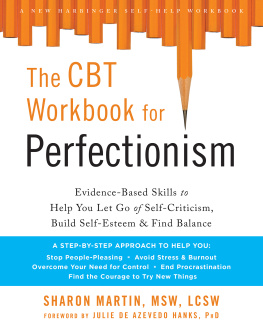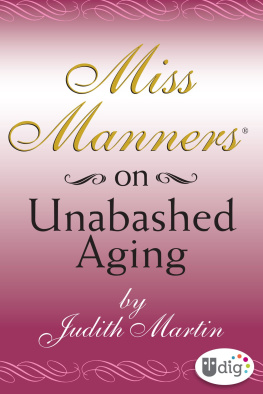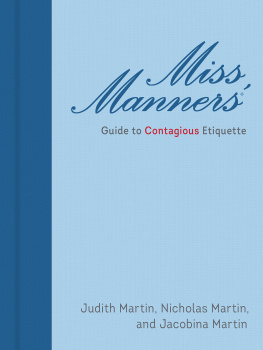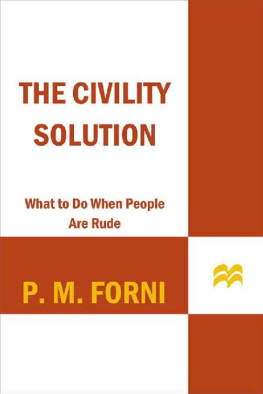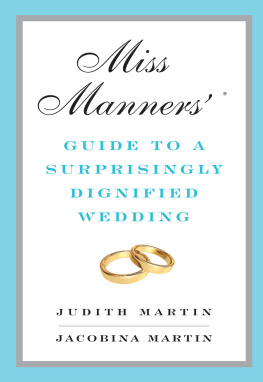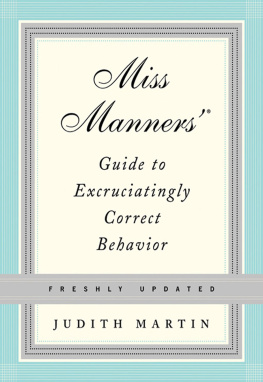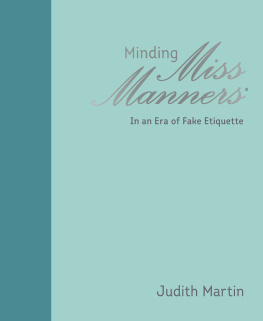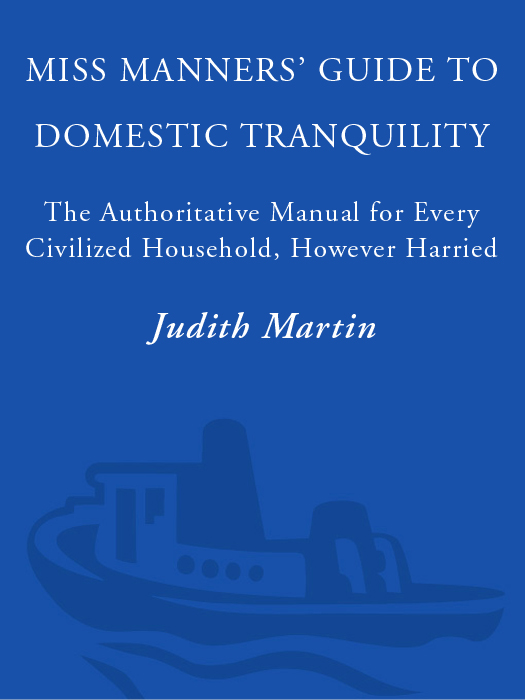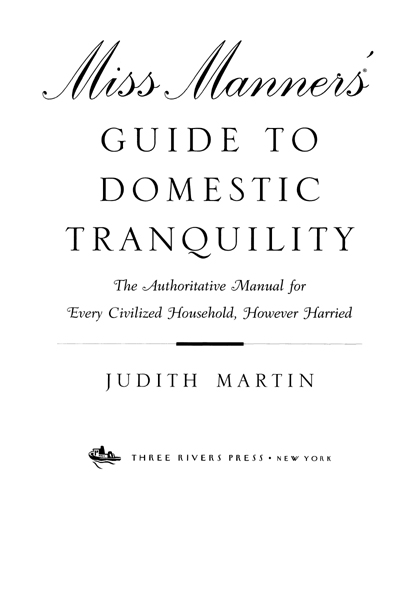OTHER BOOKS BY JUDITH MARTIN
Miss Manners Basic Training: The Right Thing to Say
Miss Manners Basic Training: Eating
Miss Manners Basic Training: Communication
Miss Manners Rescues Civilization
Miss Manners On Weddings
Miss Manners Guide for the Turn-of-the-Millennium
Miss Manners Guide to Rearing Perfect Children
Miss Manners Guide to Excruciatingly Correct Behavior
Common Courtesy
Style and Substance
Gilbert
Copyright 1999 by Judith Martin
Miss Manners is a registered trademark of Judith Martin
Illustrations copyright 1999 by Gloria Kamen
All rights reserved. No part of this book may be reproduced or transmitted in any form or by any means, electronic or mechanical, including photocopying, recording, or by any information storage and retrieval system, without permission in writing from the publisher.
Published by Three Rivers Press, New York, New York.
Member of the Crown Publishing Group.
Random House, Inc. New York, Toronto, London, Sydney, Auckland
www.randomhouse.com
Three Rivers Press is a registered trademark and the Three Rivers Press colophon is a trademark of Random House, Inc.
Library of Congress Cataloging-in-Publication Data
Martin, Judith
Miss Manners guide to domestic tranquility: the authoritative manual for every civilized household, however harried / Judith Martin.
1. Etiquette. 2. Households. I. Title. II. Title: Guide to domestic tranquility.
BJ1854.M37 1999
395dc21
9922824
eISBN: 978-0-307-55797-1
v3.1
For
Rebecca
and
Nicholas
ACKNOWLEDGMENTS
N either Miss Manners cottage industry nor her cottage would run, let alone be livable, without David Hendin, Ann Patty and Kimberley Heatherington in the one and Eunice and Willie Riddick and R.G.M. in the other.
Contents
Introduction
A blissful refuge, warm and cheery, serving as a buffer against the harsh world of commerce, competition and connivancethat was the Victorian notion of a household.
Never mind that we now know where Father was when he came home late and why Mother thought certain aspects of life not worth mentioning. Never mind that the children who grew up under such protection spent the rest of their lives sneering at those monstrous hypocrites, their parents, for being so ridiculously self-sacrificing and secretive. Providing that smug atmosphere only demonstrated how unrealistic, unimaginative and unadventurous they were, as their more sophisticated children kindly pointed out when they reached their majority.
Nowadays, the household is given greater importance than ever, but more as a source of material for social turmoil than as a refuge from it. Those peeking in the windows want to set terms for its composition, and those peeking out dont dispute the intrusion unless whatever arrangement they haverelatives, friends or strangers; the legally coupled or the extra-legally coupled; single people, single parents, single genders or the single-minded; adults with their children, his children, her children, no children or someone elses childrenis criticized.
Inside, emotional heat is expended on declarations of individual rights and transgressions, debates involving gender and generation and discussions involving possessions and relationships. It makes a chilly atmosphere, seldom warmed by courtesy, cheerfulness and cooperation.
Miss Manners contends that the domestic oasis is still a good idea. To those who even now harbor the same feelings as those Edwardian ingrates (whose own children had the nerve to call them Victorian, as succeeding history-defying generations have continued to do in turn), she would like to point out that we have now tested the counter-measures they demanded. Modern families have done what rebellious generations have long prescribed as necessary for mental health: They have brought the fresh air of frankness, honesty and openness into the suffocating atmosphere of Victorian domesticity.
The real world not only came indoors, but made itself thoroughly at home. The hearth, now known as the entertainment center, is where the family loiters when the demands and the pleasures of the commercial world have been temporarily exhaustedin order to enjoy the company of images from the commercial world.
If parties are given at all, they are less likely to be for family merriment than for advancing someones professional interests. The disappointments in parents lives, especially in the matter of romance, are no secret from their children, any more than from the rest of the town. Nor are the compensations parents seek along these lines kept hypocritically hidden. Negative moods are frankly indulged, on the grounds that no one should have to put on a falsely happy demeanor at home. Articulating ones irritation with others in the household is encouraged, both because it frankly alerts those others to their shortcomings and because it clears the air.
The trouble with such policies is that they create the need for a cozy refuge. Those who dont want to move into the neighborhood bar might learn something from the policies they spurned.
Not everything, of course. Miss Manners opposes going mindlessly back to the past, if for no other reason than that re-creating the same conditions would lead to re-creating the same opposition. Nor is she insensible to the advances made in family happiness through the sharing of feelings and the relaxation of pressures.
Nevertheless, the traditional idea of a cheerful household is worth salvaging, even though it means passing up countless opportunities to make the other residents feel ones every dissatisfaction. Part of this is merely accepting the normal ups and downs of life rather than making scenes or pointing out everybody elses mistakes and foibles. Another part is shielding children from the more frightening or less savory aspects of adult life. The very hardest part is controlling large and small impulses that do damage to others in the householdand if not controlling them, at least veiling them from view. As the beneficiaries of this policy were quick to declare, it is hypocritical. It also makes things more pleasant around the house.
BUT WERE TOO BUSY
So many people wail that they would love to do what it takes to have a pleasant householdsit down to dinner together, extend hospitality, indulge in conversation, offer the children daily guidance in politenessif only they werent so harried, that Miss Manners came to believe that such was the condition of modern life. She was not willing to concede that an entire generation had to give up civilized domestic life, but she agonized about how they could achieve it.
Tragically, there are people who are just about forced to give up living life in order to make a living. Oddly enough, these are sometimes the very people who refuse to succumb. Basic family rituals and amenities are often most strictly maintained by someone working two jobs while rearing children, perhaps alone, and still finding time to assist the occasional needy relative or neighbor. Those are not the folks from whom Miss Manners hears about modern busyness.
It was only when she took a look at the schedules of those who are doing the complaining that her sympathies began to wane. They are also working around the clock, perhaps not at two jobs but at one divided among daytime, nighttime and weekend shifts, featuring not only the work itself but working lunches, employee birthdays, client entertainment, office parties, business trips, weekend retreats and attitude-training sessions. It barely leaves them discretionary time to watch television, surf the Internet, work out, follow courses of personal self-improvement and drive their children to equally rigorous schedules.


